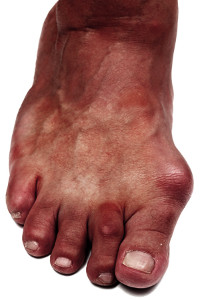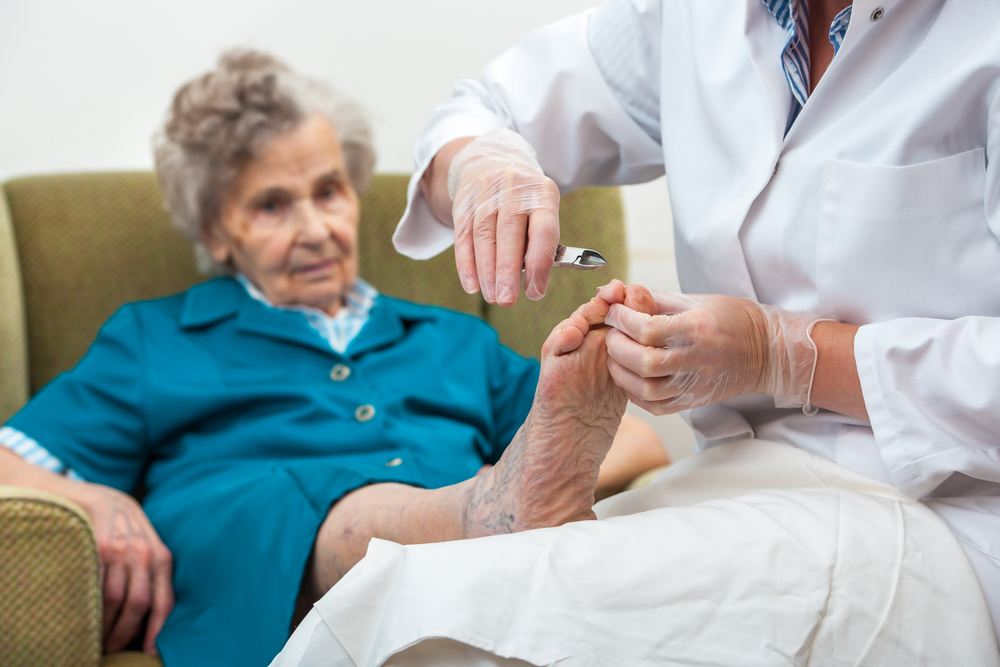Garner (919) 661-4150
March 2019
Is a Bunion a Permanent Deformity?
 If you notice a bony protrusion that may look like a permanent deformity on the side of your big toe, you may have what is known as a bunion. It may develop as a result of wearing shoes that do not have adequate room for the toes to move freely in, or possibly from a genetic trait. Some of the symptoms that are associated with this condition may be tenderness and swelling, in addition to burning or tingling sensations. If having this ailment interferes with wearing shoes and completing daily activities, many patients may choose to undergo surgery for permanent removal of the bunion. For less severe bunions, orthotics may be prescribed which may provide mild relief. If properly fitting shoes and socks are worn, painful and uncomfortable bunions may possibly be prevented. If you are affected by bunions, it is advised to speak to a podiatrist who can properly diagnosis and offer correct treatment techniques.
If you notice a bony protrusion that may look like a permanent deformity on the side of your big toe, you may have what is known as a bunion. It may develop as a result of wearing shoes that do not have adequate room for the toes to move freely in, or possibly from a genetic trait. Some of the symptoms that are associated with this condition may be tenderness and swelling, in addition to burning or tingling sensations. If having this ailment interferes with wearing shoes and completing daily activities, many patients may choose to undergo surgery for permanent removal of the bunion. For less severe bunions, orthotics may be prescribed which may provide mild relief. If properly fitting shoes and socks are worn, painful and uncomfortable bunions may possibly be prevented. If you are affected by bunions, it is advised to speak to a podiatrist who can properly diagnosis and offer correct treatment techniques.
If you are suffering from bunions, contact Chukwuma Ukata, DPM of Advanced Carolina Foot and Ankle Center. Our doctor can provide the care you need to keep you pain-free and on your feet.
What Is a Bunion?
A bunion is formed of swollen tissue or an enlargement of boney growth, usually located at the base joint of the toe that connects to the foot. The swelling occurs due to the bones in the big toe shifting inward, which impacts the other toes of the foot. This causes the area around the base of the big toe to become inflamed and painful.
Why Do Bunions Form?
Genetics – Susceptibility to bunions are often hereditary
Stress on the feet – Poorly fitted and uncomfortable footwear that places stress on feet, such as heels, can worsen existing bunions
How Are Bunions Diagnosed?
Doctors often perform two tests – blood tests and x-rays – when trying to diagnose bunions, especially in the early stages of development. Blood tests help determine if the foot pain is being caused by something else, such as arthritis, while x-rays provide a clear picture of your bone structure to your doctor.
How Are Bunions Treated?
- Refrain from wearing heels or similar shoes that cause discomfort
- Select wider shoes that can provide more comfort and reduce pain
- Anti-inflammatory and pain management drugs
- Orthotics or foot inserts
- Surgery
If you have any questions, please feel free to contact our office located in Garner, NC . We offer the newest diagnostic and treatment technologies for all your foot care needs.
Tips for Senior Foot Care
 Many elderly people may find it difficult to practice daily foot care. It’s important for seniors to wear shoes that fit comfortably, and this may prevent uncomfortable conditions from developing. These may include corns, calluses, bunions, or ingrown toenails. Research has shown the feet may change size or become wider, and it is recommended to measure them to determine the proper shoe size. Many seniors may spend the day sitting down, and poor circulation may gradually develop. This may be avoided by resisting the urge to cross the legs, in addition to frequently walking and performing gentle stretches. A common ailment that many elderly people notice is dry skin. Mild relief may be found when a moisturizer is applied several times per day. If you have questions about how to care for elderly feet, it is suggested to consult with a podiatrist.
Many elderly people may find it difficult to practice daily foot care. It’s important for seniors to wear shoes that fit comfortably, and this may prevent uncomfortable conditions from developing. These may include corns, calluses, bunions, or ingrown toenails. Research has shown the feet may change size or become wider, and it is recommended to measure them to determine the proper shoe size. Many seniors may spend the day sitting down, and poor circulation may gradually develop. This may be avoided by resisting the urge to cross the legs, in addition to frequently walking and performing gentle stretches. A common ailment that many elderly people notice is dry skin. Mild relief may be found when a moisturizer is applied several times per day. If you have questions about how to care for elderly feet, it is suggested to consult with a podiatrist.
Proper foot care is something many older adults forget to consider. If you have any concerns about your feet and ankles, contact Chukwuma Ukata, DPM from Advanced Carolina Foot and Ankle Center. Our doctor can provide the care you need to keep you pain-free and on your feet.
The Elderly and Their Feet
As we age we start to notice many changes in our body, but the elder population may not notice them right away. Medical conditions may prevent the elderly to take notice of their foot health right away. Poor vision is a lead contributor to not taking action for the elderly.
Common Conditions
- Neuropathy – can reduce feeling in the feet and can hide many life-threatening medical conditions.
- Reduced flexibility – prevents the ability of proper toenail trimming, and foot cleaning. If left untreated, it may lead to further medical issues.
- Foot sores – amongst the older population can be serious before they are discovered. Some of the problematic conditions they may face are:
- Gouging toenails affecting nearby toe
- Shoes that don’t fit properly
- Pressure sores
- Loss of circulation in legs & feet
- Edema & swelling of feet and ankles
Susceptible Infections
Diabetes and poor circulation can cause general loss of sensitivity over the years, turning a simple cut into a serious issue.
If you have any questions please feel free to contact our office located in Garner, NC . We offer the newest diagnostic and treatment technologies for all your foot and ankle needs.
Foot Surgery May Bring Relief
Many patients have foot conditions that may benefit from having foot surgery performed. This is often recommended if traditional treatment has been unsuccessful, and may be considered to find relief. Fusion surgery may help patients who have arthritis in the foot or ankle. The purpose of having this type of surgery performed is to eliminate pain and discomfort by fusing the bones together. Patients who have chronic heel pain may benefit from having heel surgery performed. This may be an option for people who are afflicted with plantar fasciitis. If you are feeling numbness or a tingling sensation in your toes, neuroma surgery may be a choice to consider. This is performed by removing a small part of the nerve, which may bring relief. If you have foot pain and are thinking about having surgery performed, it is suggested to speak with a podiatrist who can properly guide you in determining if this is right for you.
Foot surgery is sometimes necessary to treat a foot ailment. To learn more, contact Chukwuma Ukata, DPM of Advanced Carolina Foot and Ankle Center. Our doctor will assist you with all of your foot and ankle needs.
When Is Surgery Necessary?
Foot and ankle surgery is generally reserved for cases in which less invasive, conservative procedures have failed to alleviate the problem. Some of the cases in which surgery may be necessary include:
- Removing foot deformities like bunions and bone spurs
- Severe arthritis that has caused bone issues
- Cosmetic reconstruction
What Types of Surgery Are There?
The type of surgery you receive will depend on the nature of the problem you have. Some of the possible surgeries include:
- Bunionectomy for painful bunions
- Surgical fusion for realignment of bones
- Neuropathy decompression surgery to treat nerve damage
Benefits of Surgery
Although surgery is usually a last resort, it can provide more complete pain relief compared to non-surgical methods and may allow you to finally resume full activity.
Surgical techniques have also become increasingly sophisticated. Techniques like endoscopic surgery allow for smaller incisions and faster recovery times.
If you have any questions please feel free to contact our office located in Garner, NC . We offer the newest diagnostic and treatment technologies for all your foot and ankle needs.







